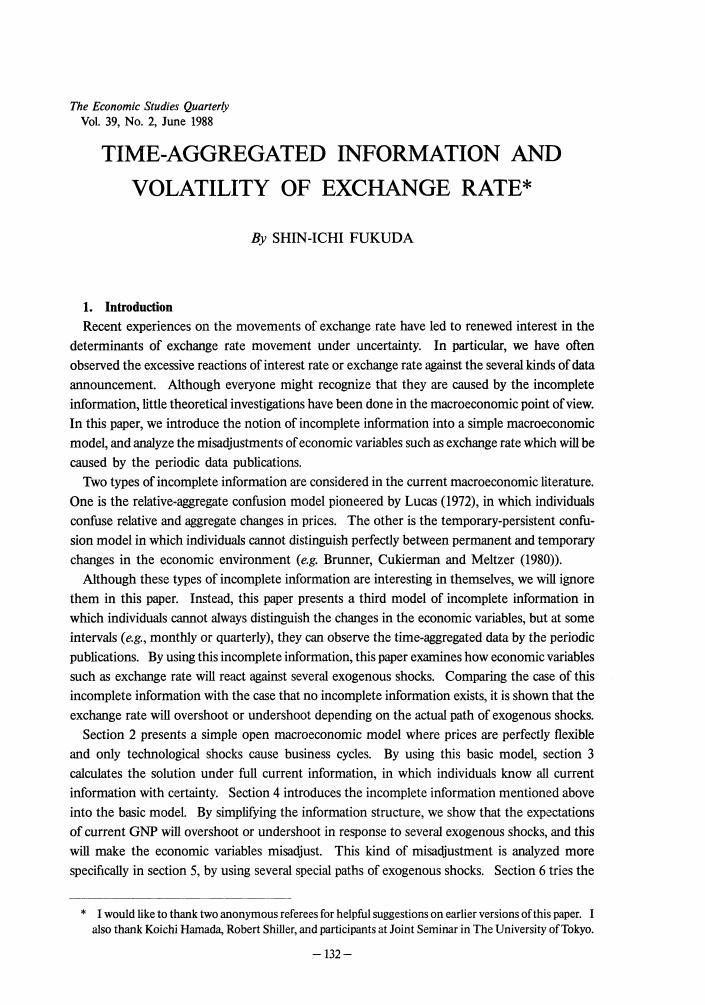1 0 0 0 OA DESIRABLE RULES OF MONETARY COORDINATION AND INTERVENTION AMONG A LARGE NUMBER OF COUNTRIES
- 著者
- SHIN-ICHI FUKUDA
- 出版者
- JAPANESE ECONOMIC ASSOCIATION
- 雑誌
- The Economic Studies Quarterly (ISSN:0557109X)
- 巻号頁・発行日
- vol.43, no.3, pp.230-245, 1992-09-18 (Released:2007-10-19)
- 参考文献数
- 24
The purpose of this paper is to analyze the appropriate stabilization rules among a large number of countries. By decomposing the world system into one aggregate and N-1 difference systems, the paper calculates the desirable monetary rules in the N-country model. we find that the optimal monetary rule is a combination of the global monetary rule and the intervention rule. In general, the derived rule depends on the number of countries and the relative magnitudes of exogenous variances. The paper first analyzes the symmetric world economy and extends the results to the asymmetric world.
- 著者
- SHIN-ICHI FUKUDA
- 出版者
- JAPANESE ECONOMIC ASSOCIATION
- 雑誌
- The Economic Studies Quarterly (ISSN:0557109X)
- 巻号頁・発行日
- vol.43, no.1, pp.33-51, 1992-03-19 (Released:2007-10-19)
- 参考文献数
- 19
This paper investigates a new welfare implication of foreign exchange market intervention under time-consistent monetary policy. When the monetary authority can observe nominal exchange rate instantaneously, there exists an incentive to intervene in foreign exchange market. However, the lower degree of intervention reduces the temptation for the monetary authority to generate unanticipated inflation. Hence, a rise in the variance of import shocks which reduces the degree of intervention might raise the social welfare in a Nash equilibrium. Furthermore, because of these endogenous intervention rules, the gains from coordination depend on the relative magnitude of various exogenous variabilities.
1 0 0 0 OA CHOICE OF MONETARY POLICY INSTRUMENT WHEN THE FEEDBACK RULE ON PAST DISTURBANCES IS OPTIMALLY CHOSEN
- 著者
- SHIN-ICHI FUKUDA
- 出版者
- JAPANESE ECONOMIC ASSOCIATION
- 雑誌
- The Economic Studies Quarterly (ISSN:0557109X)
- 巻号頁・発行日
- vol.41, no.4, pp.289-299, 1990-12-20 (Released:2007-10-19)
- 参考文献数
- 21
This paper investigates the optimal choice of monetary policy instrument when the feedback rule on past disturbances is optimally chosen. In the analysis, monetary feedback rule is based not only on current interest rate but also on past disturbances. In the neoclassical model where expectations are rational, the choice of monetary instrument can be redundant in stabilizing output. However, in the sticky price model and the model with adaptive expectations, the choice of monetary instrument in stabilizing output is the Pool's rule whether the feedback rule on past disturbances is optimally chosen or not. A crucial point in the analysis is that the price equation is forward-looking in the neoclassical model with rational expectations but is backward-looking in the sticky price model or the model with adaptive expectations.
- 著者
- SHIN-ICHI FUKUDA
- 出版者
- JAPANESE ECONOMIC ASSOCIATION
- 雑誌
- The Economic Studies Quarterly (ISSN:0557109X)
- 巻号頁・発行日
- vol.39, no.2, pp.132-148, 1988-06-20 (Released:2007-10-19)
- 参考文献数
- 10
